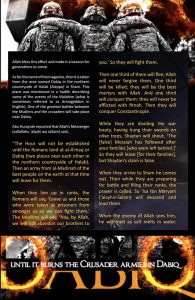In the excitement over a new prophecy, an unfulfilled old one is receiving less attention than it might.
The new prediction comes from Baghdad, Washington, Ankara and Erbil and it is upbeat. We are told that the battle for Mosul will fatally damage the Islamic State’s pretensions to having and holding an Islamic state.
The old forecast was an apocalyptic piece of propaganda from the Islamic State (ISIS). It promised that the northern Syrian town of Dabiq would be the site of a conclusive battle between Muslims and non-Muslims. The Prophet had prophesied as much, ISIS said, quoting the oft-disputed hadith or sayings of Prophet Mohammad.
As it happens, Dabiq has fallen, there was not a mighty clash, let alone between Muslims and non- Muslims, and that prophecy from ISIS failed to live up to its billing.
But here is a basic fact about that battle for Dabiq. ISIS cannot be strictly accused of speaking falsely. The battle for Dabiq was not the epic prophesied clash between Muslims and non-Muslims because the rebel groups that took the town were Muslim. ISIS pointed this out after it relinquished Dabiq and it is right.
One of the groups that moved on Dabiq was the Hamza Brigade. It is a small, Pentagon-supported unit. The Hamza Brigade, the Sultan Murad Brigade and the Levant Front are on the same side as the United States and Turkey. Larger, more hardcore Islamist groups such as the former al-Nusra Front are not included in the ragtag band that has been cobbled together.
It is hard to imagine that a historic clash between Muslim and non- Muslims will come to pass in Dabiq now. For that to happen, ISIS would have to regain control of Dabiq and the United States, Britain, Canada, France or a NATO force would have to put boots on the ground in that part of Syria. Western forces would have to fight ISIS as one army against another, rather than in support and advisory roles. This has been the practice for the US-led coalition in its struggle to regain the territory ISIS seized in 2014 and 2015.
ISIS has cannily suggested the Dabiq prophecy is merely postponed and that the two armies will fight another day. But, as William McCants, an Islamic specialist at Brookings Institution, points out on the respected website jihadica.com, that ISIS itself did not really believe in the Dabiq prophecy until April 2014 when it won territory in northern Syria. Then, the group — spectacularly shrewd and ferociously disciplined as jihadists go — seized upon the town and the alleged prophecy as a powerful tool in the propaganda war.
It used Dabiq just as it did the restoration of the caliphate, the proclamation of an emir for all Muslims and the demolition of a sand berm separating the colonially drawn boundaries between Iraq and Syria. Individually, none of these had cataclysmic force. Taken together, they became a symbol of a glorious Islamic past uniting with a glittering future for all Muslims. And they awakened a deep foreboding in the West, a presentiment of looming disaster and helplessness.
To ISIS, the notion of a coming clash in Dabiq has always been an attractive bit of historical reinvention that aided the recruitment of fighters. In mid-2014, it started to issue an online magazine, calling it Dabiq, in a bid to underline its determination to claim a grand and pivotal role in Islamic history.
It declared that it would establish Habasha, an emirate that would include Sudan, Ethiopia, Somalia and Eritrea. Here, too, Islamic history was cunningly pressed into service. The Prophet’s followers travelled to Habasha in Islam’s early days.
ISIS spoke of reclaiming Barqa, as eastern Libya was known after the seventh-century Arab conquest. At the height of its triumphs on the battlefield, ISIS put out a map of the world with blocs that harkened to specific periods in 1,400 years of Muslim rule over different parts of the world — Andalus, Khorasan, Qoqaz, Anathol, Orobpa.
There was a remarkable logic in this historical reinvention. The French historian Fernand Braudel once said that a steady grasp of the long term may be the only way to properly use history for political purposes. Braudel said that events must be seen as distinct from history. Events are brief, rapid, nervous oscillations, the “froth” on the waves of time, but history takes place at greater depths and may be largely unremarked. Its unseen consequences will make connections at the level of ideas.
By reaching into Islamic history — for names, prophesied battles and such — ISIS sought to make that grand connection, as well as a narrative statement about worsting the West. Not by “events” such as battles, skirmishes and the temporary gain or loss of territory but by embracing a longer timescale, stretching back millennia.
Losing Dabiq, the town, if not the promised epic battle, does not bode well for that.
For now, that is the prophecy that should count.


